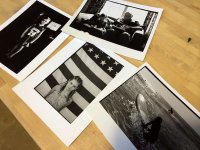Embarrassingly, I haven't yet figured out how to use the stock Leitz Focomat 1c easel to get the images centered on the paper.... And I screwed up a good 2 or 3 test strips, but you do have to start somewhere.
Stock Leitz easel is wood with two blades. Control the border width by moving the top and left border set tabs to max. Then set the bottom and right.
If you have the later white, you are lucky as it is a 4 blade and you move the blades inward. I drew out a 5x7 on 8x10 paper and saved it . It is a guide for setting all future from that format.
In a pinch, get a mat board and mask down the paper to a fixed size.
Get a 11x14 Saunders Universal with 1" high base. It has 4 blades independently set. Make up format masks as described above to easily make repeatable settings.
You do not make prints by pulling from developer when they look right.
Develop RC paper 75 sec and fiber 150 sec. Adjust exposure as required. Early pulls give weak blacks and you over exposed. Remake.
Warm tone papers are different.
Properly exposed negs will print at a standard exposure. Say 30 sec at F8 for a given paper. All you need is a 1x8 strip put across the critical area of the print. Say across the eyes in a portrait. Make one strip, check, repeat. You don`t need 10 with 9 bad ones.
Start with a contact sheet with enlarger set for 8x10 prints. You will see
which are over and which are under and adjust test strip from there.
The contact is same exposure a real 8x10 except you need 7% more for the glass.
3.5x, 5x, 8x,11x, 16x each are one stop apart in exposure. Go by where enlarger head is set, not cropped area. F stop are accurate. Time is not because of reciprocity failure, the failure to change density in a linear manner with time. Film does it too. An enlarging meter is nice because you can find proper times for 5x7 test, reset to 11x14, open the lens with meter in place to get the same exposure. Saves time and paper. You will find it is 2 stops if the meter cell is exactly at the the paper plane.
Good first trys.
Learn to expose properly in camera and darkroom times are MUCH more productive because you are not chasing the correct exposures. Don`t stint on chemicals as you get crappy prints and you can not figure what is wrong. It is a waste of time and materials.
Oh the exposure steps above are for 35mm only. Larger formats are different.


